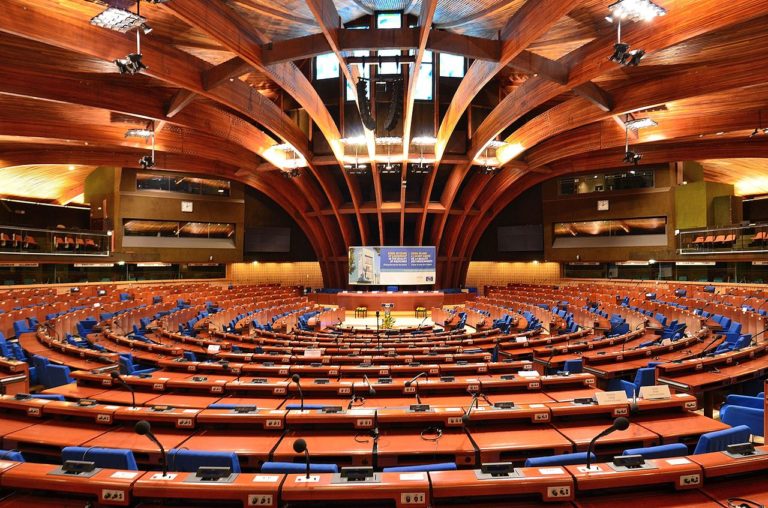
The resolution presented by the Council of Europe Committee on Legal Affairs and Human Rights calls on Spain to stop the persecution of Catalan political representatives and peaceful protesters, to release those incarcerated, to reform the penal code, and to refrain from asking prisoners to disown their political ideas. In an attempt to whitewash Spain’s international reputation, the Spanish government has approved today a pardon for nine imprisoned Catalan leaders.
On Monday the 21st of June, the Parliamentary Assembly of the Council of Europe (PACE) debated and adopted the resolution “Should politicians be prosecuted for statements made in the exercise of their mandate?”, drawn up by the rapporteur Boriss Cilevičs, a member of the Council’s Committee on Legal Affairs and Human Rights. The text had the support of 70 members, while 28 voted against, and 12 casted a blank vote.
During the debate prior to the vote on the resolution, the rapporteur, Mr. Cilevičs, emphasized that “Turkey and Spain have one thing in common: they have elected representatives who have been imprisoned for their public opinion. This is something that does not happen anywhere else in Europe.” He also stressed that “the exercise of fundamental rights, such as calling peaceful demonstrations, especially when it is exercised by so many people, can never be considered a crime.”
The resolution not only compares the behaviour of Turkish and Spanish authorities, but in relation to the Spanish authorities, it stresses that “the mere expression of pro-independence views is not a ground for criminal prosecution”. Moreover, it draws attention to the disproportionate pre-trial detention and 9 to 13-year prison sentences for Catalan political leaders “inter alia for statements made in the exercise of their political mandates”, in support of the Catalan pro-independence referendum of October 1st, 2017, which was roughly repressed by Spanish security forces under the orders of the Spanish authorities.
In this sense, the PACE also calls on Spanish authorities to reform the criminal code in relation to the outdated crimes of rebellion and sedition -no longer present in the majority of European states- so that they “cannot be interpreted so as to undo the decriminalisation of the organisation of an illegal referendum or lead to disproportionate sanctions for non-violent transgressions”.
The report also calls for the release of Catalan civic and political leaders “convicted for their role in the organisation of the 2017 referendum and the related peaceful mass demonstrations”, to “consider dropping extradition proceedings against Catalan politicians living abroad who are wanted on the same grounds” and to stop the prosecution of lower-ranking officials involved in the referendum. In addition, it stresses that the Spanish authorities should also refrain from requiring the detained Catalan politicians to disown “their deeply held political opinions in exchange for a more favourable prison regime or a chance of pardon”.
In this sense, it is worth noting that the amendments presented by Spanish representatives to try to dilute the severity of the text were all rejected by a large majority. The aim of these amendments, a dozen in total, some made by socialist representatives, and others by the People’s Party, was to diminish or directly remove concepts that referred to the prosecution of representatives for organizing a referendum, the request to release of prisoners, or to stop the prosecution of exiles and senior government officials, among others.
This is a new admonition to the Spanish authorities, who have already received multiple calls for their immediate release, such as those of the United Nations Working Group on Arbitrary Detention, as well as non-governmental organizations such as Amnesty International, the World Organization Against Torture and the International Commission of Jurists, among others. Since 2017, the ceaseless criminalization of the political will of the people of Catalonia by the Spanish state has led to the prosecution of nearly 3,300 people.
Spanish government pardons nine Catalan leaders
Spanish Prime Minister Pedro Sánchez was yesterday in Barcelona to announce pardons for the nine Catalan civil and political leaders imprisoned for the organization of the referendum on October 1st, 2017, and for calling peaceful demonstrations. With this gesture, which has been confirmed during today’s Council of Ministers, Mr Sanchez is attempting to stage an apparent resolution to the Catalan conflict. But nothing could be further from the truth. This is a particular solution for nine individuals who, in recent years, have suffered first-hand the brutal repression of the Spanish state. Yet Catalan representatives in exile, as well as more than 3,000 people retaliated against, have been left out of these measures.
Additionally, the Spanish Government has announced that the pardons are conditional: if the leaders dare to avail themselves of their fundamental rights again, supporting the people of Catalonia’s will to exercise their full sovereignty once more, the State will automatically imprison them. Therefore, the decision of the executive is only understood from the point of view of self-interest, with disregard to that of Catalonia. It is unrealistic to consider an agreed political solution to the conflict with the Spanish state if this does not include the surrender and humiliation of the Catalan independence movement. The only solution to the conflict is the end of Spanish lawfare and political repression, and the recognition of the right to self-determination of the Catalan people. Something that several Spanish Ministers and Mr Sánchez himself have already expressed on several occasions that they will never accept.